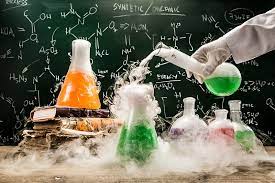Chemistry
Chemistry
The study of the composition, structure, and characteristics of matter is the focus of the scientific field of chemistry. It focuses on the investigation of how matter alters under various circumstances. Because it provides a fundamental framework for comprehending both basic and applied scientific fields, it is also referred to as the central Science. For instance, Chemistry explains the chemistry of plants (Botany), the formation of igneous rocks (Geology), how pollutants are eliminated from the environment (Ecology), the characteristics of the soil on the moon (Astrophysics), how drugs work (Pharmacology), and how to gather DNA evidence at a crime scene (Forensics). Chemical interactions between atoms and molecules to create new chemical compounds is one of the many subjects covered by chemistry. Our A level Chemistry course covers a wide range of topics, from examining the structure, characteristics, and behaviour of atoms to addressing current global issues like biofuels, medications, climate change, and space exploration. The emphasis is on practical labour. Not only is it essential to learn how to be a confident and skilled chemist to pass the exam and land a job, but it's also necessary to prevent poisoning others, blowing up the lab, or setting yourself on fire. As a result, there are many possibilities for students to apply their academic knowledge in real-world situations. At our college we follow AQA specification for A level Chemistry. The course covers mainly three areas of chemistry Inorganic examines the characteristics of the elements, except carbon, and their compounds Physical works at a molecular and atomic level and investigates how chemical reactions occur Organic chemistry explores the chemical reactions in living organisms and what can be derived from them, for example petrochemicals, shampoos, paper, drugs, synthetic fibres
In AS level students cover following topic alongside their practical sessions. The practical sessions are internally assessed and endorsed during the course to help students to develop and demonstrate their understanding and competencies.

AS Level Specification – AQA 7404
1) Physical chemistry
1.1) Atomic structure
1.2) Amount of substance
1.3) Bonding
1.4) Energetics
1.5) Kinetics
1.6) Chemical equilibria and Le Chatelier’s principle and Kc
1.7) Oxidation, reduction and redox equations
2) Inorganic chemistry
2.1) Periodicity
2.2) Group 2, the alkaline earth metals
2.3) Group 7(17), the halogens
3.1) Introduction to organic chemistry
3.2) Alkanes
3.3) Halogenoalkanes
3.4) Alkenes
3.5) Alcohols
3.6) Organic analysis
Assessments
Paper 1
- Physical chemistry topics (sections 1.1 to 1.4, 1.6 and 3.1.7)
- Inorganic chemistry topics (section 2.1 to 2.3)
- Relevant practical skills
- Written exam: 50% of the AS
- 1 hour 30 minutes 80 marks
- 65 marks of short and long answer questions
- 15 marks of multiple-choice questions
Paper 2
- Physical chemistry topics (sections 1.2 to 1.6)
- Organic chemistry (section 3.1 to 3.6)
- Relevant practical skills
- Written exam: 50% of the AS
- 1 hour 30 minutes 80 marks
- 65 marks of short and long answer questions
- 15 marks of multiple-choice questions
A Level
A level specification – AQA 7405
A level Chemistry requires the AS content listed above plus:
1) Physical chemistry
- 1.8) Thermodynamics
- 1.9) Rate equations
- 1.10) Equilibrium constant Kp for homogeneous systems
- 1.11) Electrode potentials and electrochemical cells
- 1.12) Acids and bases
2) Inorganic chemistry
- 2.4) Properties of Period 3 elements and their oxides
- 2.5) Transition metals
- 2.6) Reactions of ions in aqueous solution
3) organic chemistry
- 3.7) Optical isomerism
- 3.8) Aldehydes and ketones
- 3.9) Carboxylic acids and derivatives
- 3.10) Aromatic chemistry
- 3.11) Amines
- 3.12) Polymers
- 3.13) Amino acids, proteins and DNA
- 3.14) Organic synthesis
- 3.15) Nuclear magnetic resonance spectroscopy
- 3.16) Chromatography
Paper 1
- Physical chemistry topics (sections 1.1 to 1.4, 1.6 to 1.8 and 1.10 to 1.12)
- Inorganic chemistry (Section 3.2)
- Relevant practical skills
- Written exam: 35% of A level
- 2 hours 105 marks
- 105 marks of short and long answer questions
Paper 2
- Relevant Physical chemistry topics (sections 1.2 to 1.6 and 3.1.9)
- Organic chemistry (Section 3.3)
- Relevant practical skills
- Written exam: 35% of A level
- 2 hours
- 105 marks of short and long answer questions
Paper 3
- Any content. Any practical skills
- Written exam: 30% of A level 2 hours 90 marks
- 40 marks of questions on practical techniques and data analysis
- 20 marks of questions testing across the specification
- 30 marks of multiple-choice questions
